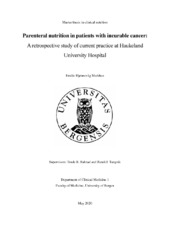| dc.description.abstract | Background: The use of PN therapy in patients living with incurable cancer is understudied, and there is a need for a stronger evidence base regarding this treatment in patients with incurable cancer. Aims: This study aimed to describe the following aspects of PN treatment in patients with incurable cancer: indications for PN, dosage of PN given and dosage according to estimated energy requirements, administration of PN, duration of PN, reason for discontinuation of PN and survival on PN. Methods: A retrospective medical chart review of patients with incurable cancer receiving PN at Haukeland University hospital from 2011 to 2018 was conducted. Data on patient characteristics related to the time before the start of and during PN treatment, administration of PN and dosages of PN, time of termination and reason for termination, were collected. Results: Data from 133 medical charts were included. Mean (SD) age was 64 (±12,4) years and 61 (45.9%) were male. The most common types of cancer were upper GI (n=48, 36.1%), and colorectal (n=31, 23.3%), and 111 (83.5%) of the patients had metastases. The most frequent indication for start of PN was insufficient oral and/or enteral intake. Most of the patients received PN daily. Mean (SD) estimated energy intake was 33 (6) kcal/kg/day. Median (Q1-Q3) start dose was 1000 (570-1100) kcal/day. Median highest dose received was 5 kcal/kg lower than estimated energy needs. Median (Q1-Q3) duration of treatment was 44 (18-99) days. Median (Q1-Q3) survival from start of PN was 81 (41-159) days. There was a positive correlation between duration of PN and survival from PN start, correlation coefficient rs=0.751, p<0.0005. Conclusion: The findings indicate that PN therapy in patients with incurable cancer was distributed across the population in terms of dosages, duration and survival. Most of the patients receive less than estimated energy needs from PN. Patients receiving PN for a longer period of time also survive longer. Discontinuation of PN was based on expected survival, complications related to treatment as well as tolerance to PN. | en_US |
